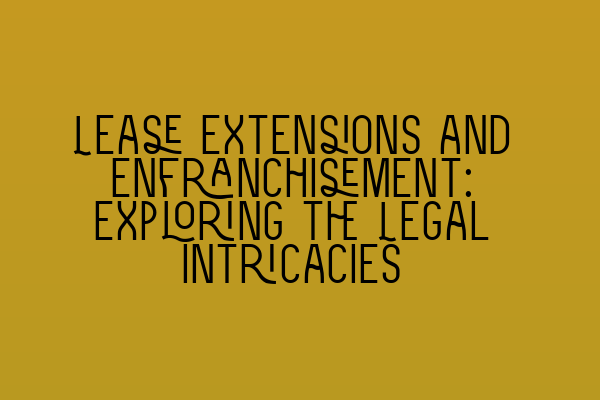Lease Extensions and Enfranchisement: Exploring the Legal Intricacies
In the world of property law, lease extensions and enfranchisement can be complex and confusing topics. Whether you are a landlord or a tenant, it is crucial to have a solid understanding of the legal intricacies involved in these processes. In this article, we will delve into the key aspects of lease extensions and enfranchisement, providing you with valuable insights and knowledge. Let’s begin!
Understanding Lease Extensions
A lease extension refers to the process of extending the length of a lease. Leases are commonly issued for a fixed term, and when that term is near expiry, tenants may have the right to request an extension of their lease. This process is regulated by specific legislation, such as the Leasehold Reform, Housing, and Urban Development Act 1993.
One of the factors that determine the eligibility for a lease extension is the length of the original lease. Generally, tenants must have owned the leasehold interest for at least two years before they can exercise their right to extend the lease. However, there are exceptions to this rule, such as when the lease was acquired through statutory enfranchisement.
It is important to note that lease extensions are not automatic and require diligent legal procedures. The tenant must serve a formal notice on the landlord, expressing their intention to extend the lease. This notice should contain specific information, including the proposed terms and premium for the lease extension. Failure to comply with the prescribed requirements can result in the notice being deemed invalid.
Once the notice is served, negotiations between the tenant and landlord will usually take place to determine the terms of the lease extension. These terms may include the lease premium, ground rent, and any other conditions or covenants that the parties wish to include. It is advisable for both parties to seek legal advice during this negotiation stage to ensure their interests are protected.
Upon agreement of the lease extension’s terms, a formal deed is prepared and executed by both parties. This document will outline the extended lease’s provisions, including any revised terms or additional clauses. It is crucial to have a comprehensive and legally binding deed to avoid future disputes or misunderstandings.
It is worth noting that the cost of extending a lease can vary significantly depending on various factors, such as the property’s value, the remaining lease term, and ground rent. Seeking professional valuation advice can help in determining a fair premium for the lease extension.
Exploring Enfranchisement
Enfranchisement, on the other hand, refers to the process by which tenants gain a collective right to purchase the freehold of their property. This right is granted under the Leasehold Reform, Housing, and Urban Development Act 1993 and allows tenants to acquire more control and ownership over their property.
For the enfranchisement process to be initiated, certain criteria must be met. Firstly, a majority of the qualifying tenants in the building or complex need to participate. Secondly, the property must satisfy certain requirements, such as being a self-contained property or part of a building with at least two flats.
It is important to note that enfranchisement is not a straightforward process and can involve complex legal procedures. Tenants must serve a formal notice on the landlord, expressing their intention to exercise their right to enfranchise. This notice should contain specific information, including the proposed purchase price and any other terms and conditions agreed upon.
Just like with lease extensions, negotiations between the tenants and the landlord will usually follow the service of the notice. Issues such as the purchase price, apportionment of costs, rights of access, and management arrangements need to be discussed and agreed upon.
Once an agreement is reached, a formal conveyance is prepared and executed by both parties. This document transfers the freehold interest from the landlord to the tenants, granting them full ownership and control over the property.
The Importance of Legal Support
Lease extensions and enfranchisement involve intricate legal processes that require careful attention to detail. Engaging a solicitor with expertise in property law is crucial to ensure that your rights and interests are protected throughout the process.
A specialist property solicitor can assist you in understanding the legal intricacies, drafting and serving notices, negotiating terms with the other party, and preparing legally binding documents, such as leases or conveyances. They will also guide you through any potential disputes or challenges that may arise, offering you peace of mind throughout the lease extension or enfranchisement process.
Conclusion
Lease extensions and enfranchisement can seem like daunting prospects, but with proper understanding and legal guidance, they can be navigated successfully. Whether you are a tenant seeking to extend your lease or a group of tenants looking to acquire the freehold, it is crucial to seek professional advice and assistance.
At SQE Property Law & Land Law, our team of experienced property solicitors can provide the expertise and support you need throughout the lease extension or enfranchisement process. Contact us today to learn more about our services and how we can assist you in securing your rights and achieving your property goals.
Related Articles:
